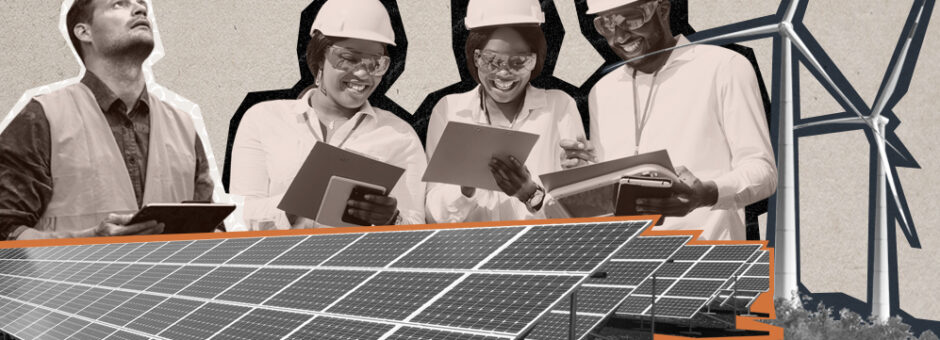Related:
Minds of Mining: Industry Experts Discuss the Future
It’s not news: the social and political will to ramp up the ‘green economy’ have never been stronger. A key component of this will be the utilization of renewable natural resources. It won’t be easy, but what worthwhile process ever is? Getting it right will require the right mix of technology and human resources. What’s the right recipe and what does it mean for Canada’s economy?
Which Skill Sets are Needed for the Green Economy?
“Today, skills gaps are already recognized as a major bottleneck in a number of sectors, such as renewable energy, energy and resource efficiency,” says the International Labour Organization.1
Continuous boom-bust cycles have caused many in Canada’s oil and gas sector to grow weary and a growing number are seeking refuge in more stable industries. While green jobs are emerging, they are not yet sufficient to re-employ the numbers of Canadians that earn or earned their living in more traditional energy segments. As the green economy continues to develop, there is hope that it could alleviate the economic pain caused by a declining oil and gas market.
Of course it’s not as easy as simply catapulting people into new roles, which means that careful forward planning must be done to ensure that the human resources are available when needed.
“What I believe is that as the (energy) industry evolves to cleantech it will require people who understand the energy process, the equipment, the problems of energy,” says labour force consultant Cheryl Knight, president of Cheryl Knight & Associates in Calgary, “and they will bring that knowledge with more ‘bolt on’ digital skills to use in an energy focused area.”2
“The green economy is also raising the demand for some mechanical skills, such as equipment maintenance and repairing, which have diminished in importance in recent decades,” writes Rakesh Kochhar for Pew Research. “With its emphasis on the environment and the sustainable use of resources, the green economy has stimulated employment in existing engineering and production jobs, ranging from industrial engineers to electricians, which often call for mechanical proficiency.”3
Renewable Resources, the Energy Grid, and AI
One important component of Canada’s evolving environmental strategy is its energy grid. Canada already powers its grid using nearly 70% renewable resources4, but a desire to increase that number, coupled with growing demand for electricity, will require the nation to onboard more renewable energy.
In Canada, and elsewhere, this process is not without its challenges. Resources for the Future researchers Kathryne Cleary and Karen Palmer explain.
“While renewables are preferable to fossil fuel generators from an emissions standpoint, power output from renewable sources depends on variable natural resources, which makes these plants more difficult to control and presents challenges for grid operators.”5
Predicting both energy supply and demand is a task that increasingly involves AI, IoT, and data. EY reports that self-learning weather models, real time measurement, sensors, and cloud information are helping grid operators see a 30% improvement in solar forecasting.6
“The industry is changing from a market based on commodity pricing to a market based on technology solutions in order to integrate renewable energy,” writes EY Global Innovation Lead Thierry Mortier. “As the energy industry continues to utilize more variable generation sources, accurate forecasts of power generation and net load are becoming essential to maintain system reliability, minimize carbon emissions and maximize renewable energy resources.”6
Green Energy Projects and the Need to Prepare the Workforce
Calgary based MCloud Technologies is a software company that helps mid-stream oil and gas companies avoid ‘unplanned downtime’ by detecting failures before they occur.2 AI helps their software monitor equipment, requiring engineers, analysts, and IT specialists to operate.
Ensuring that the needs of the ‘green economy’ are met by the workforce involves collaboration between private companies, government, and educational institutes.
“A lot of the green jobs are tech-related,” says Brad Parry, interim president and chief executive of the Calgary Economic Development Corp. “and the demand for digital talent is skyrocketing.”2
The CEDC recently launched Edge 2.0, a program it designed in partnership with local universities, which aims to help oil and gas workers prepare for a digital economy.
“There’s an amazing ability to transition given the engineering backgrounds they have,” says Parry.
Karen Speirs, a senior communications manager at B.C.-based cleantech accelerator Foresight agrees.
“Often people already have the skills to work ‘green jobs,’” Speirs said. “We have found there is a perception that cleantech skills are highly specialized. It can often be the case that common workforce skills are needed, albeit applied with a different lens.”2
What seems clear is that green energy projects will not slow down. ATCO recently announced plans for two solar farms to be built within the City of Calgary, capable of powering 18,000 homes.
“We know intuitively our friends and neighbours want to live more sustainably,” says ATCO senior VP of North American renewables Karen Nielson. “We see our goal as providing them with the solutions so they can make the choices to live the way they want.”7
These kinds of projects will continue to place a strong imperative upon the workforce to keep pace, and will provide opportunities for those willing and able to retool their skills, both high tech and otherwise.




